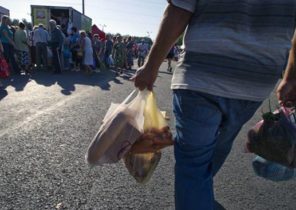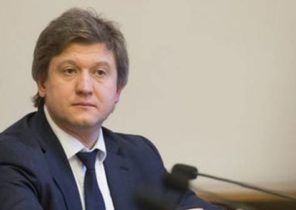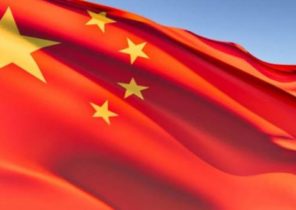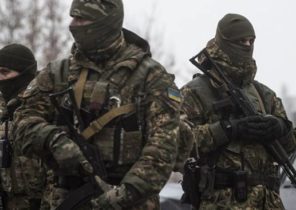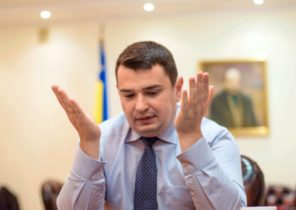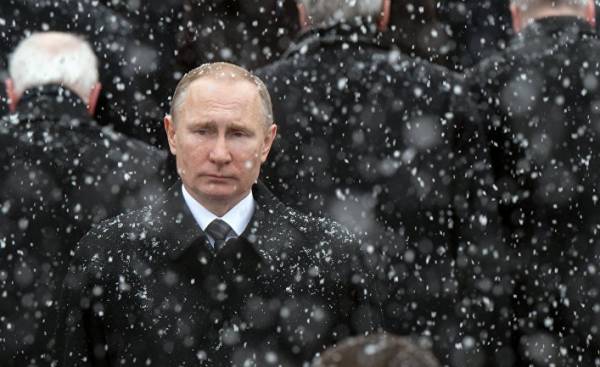
After the defeat in the cold war and the period when it was called “giant standing on his knees,” Russia has managed to transform itself into a superpower, which thanks to the skillful maneuvering threatens to turn the global hegemon, retained their status for many decades, and the losers to change the world order.
The collapse of the Soviet Union the biggest geopolitical catastrophe of the XX century, as stated in 2005, the President of the Russian Federation Vladimir Putin. Historical period which began after the collapse of the Soviet Union, can only be associated with that period of Russian history known as the Troubles. The era of nationalist conflict and war, General impoverishment, social and political instability, criminalization of society. The chaos has spread to the East of Europe and the Federative Yugoslavia as was at this time plunged into a bloody civil war.
The West, led by the United States of America could breathe a sigh of relief and proclaim your victory. In February 1992 the Maastricht Treaty created a European Union which United the countries of Western Europe around the earlier United Germany. Soon the West broke its promise (“firm guarantees” given to the Soviet leadership) that NATO “one inch will not move in the Eastern direction.”
So a weakened Russia was forced into the boundaries imposed on her by the West (border of the Russian Federation), has lost huge territory and left millions of Russians outside their homeland. The newly formed States were almost without exception non-functional and dependent on Moscow or Washington, because it was a territory that has traditionally relied on Russia or was an integral part of it. The nationalist movement that emerged in these countries have been primarily anti-Russian character. The first Chechen war (1994 to 1996), during which Chechen rebels used the undisguised sympathy and support of the West, confirmed the dire predictions: a confrontation of the cold war was a consequence not so much to ideological differences as the age-old geopolitical antagonism to the dominant land power in Eurasia and the sea of the West, riddled with Atlanticism. Began pressure on Russia and the West have questioned even the territorial integrity of the already “stripped-down” of Russia. Around the same time (1996) is an American strategist Zbigniew Brzezinski in his book “the Grand chessboard” has openly advocated for “decentralized Russia, which is a strong immunity to the imperialist ambitions”. In fact, Brzezinski’s idea is to divide Russia into three independent republics: “the European part, the Siberian Republic and far Eastern Republic.”
The strategy that the West had chosen against Russia, geopolitics is known as the “strategy of the Anaconda”. It was developed by the American Admiral Alfred Mahan: we are talking about compression of the “sea serpent” (USA) ring around the land mass (Russia and previously the USSR) with the help of military alliances, blockades, control of coastal areas, while the enemy will not be “strangled”.
Conspiracy “Swahili”
In the mid 90-ies of the last century, Russia was on its knees and could not do anything to stop such plans of the West. Under Yeltsin, Russia continued to go to the bottom: economic, financial, cultural and political. In international politics it is more did not play a significant or constructive role. Russian Imperial history have been completed, or at least so it seemed. Belovezhskaya Pushcha was actually signed the capitulation, but that was not enough, because the Western appetite was much more. Section of Russia, which wrote Brzezinski, seemed more realistic solution. All of this was a direct outcome of the geopolitical catastrophe, which Putin said.
Under Yeltsin, Russia was a grim picture of the once defeated a great power and a society doomed to decay. The former Empire has become almost a colony of Western countries, which flourished only corruption and poverty. In the West, even there were suggestions to give the Russian resources “at the disposal of all mankind”, i.e. the West.
The turning point came quite suddenly after the change of power on 31 December 1999. Boris Yeltsin handed power to Putin, who a few months earlier, was appointed Prime Minister. The transfer of power took place in a previously unseen way, and under very mysterious circumstances. According to some versions, Putin was chosen for this role not Yeltsin, as defined by the military and intelligence agencies, left over from the Soviet Union. Old Yeltsin was forced to sign a resignation in exchange for guarantees of immunity him personally and his family.
The new leader was a charismatic person who does not reminiscent of the Soviet apparatchiks like Brezhnev or liberal politicians of the Yeltsin era. In Russia, Putin’s popularity has grown rapidly, and its appearance and mysterious ascension to the pinnacle of power from the beginning caused confusion and rumors. In the novel “Mr. Geksogen” 2001, the Russian writer Alexander Prokhanov describes the conspiracy, “Swahili”, which was organized by the old intelligence structures to force an exhausted President to voluntarily hand over power to their chosen man. French writer and esoteric Jean Parvulesco during his first mandate, Putin published his book “Putin and the Eurasian Empire,” in which the new Russian leader writes as a man with a predefined mission to realize the old geopolitical integration projects in Eurasia as a Federal continental bloc “from the Atlantic to the Pacific ocean.”
The inauguration of Vladimir Putin took place on the seventh of may, 2000 at the St. Andrew hall of the Grand Kremlin Palace, which was restored to this event. The ceremony was attended by Patriarch Alexy II and the Supreme shaman of Siberia Tauzin of Bergen. “Here,’ wrote the historian Roy Medvedev. — George, Andrew and Alexander halls were crowned Russian tsars”. During the ceremony, Yeltsin handed over to Putin, “the President’s crown, which was controlled personally, and which reminded the king. “Geopolitical mystic” Parvulesco adds that immediately after the inauguration, Putin held a special ceremony, a secret ritual going down “of the courtyard (of the Kremlin), where it was expected the armed forces with his old banner, and the show he spent in the military ceremonial of Imperial Russia”. Even if all this is a fantasy of the writer or myth, they seen the logic of future events.
The Strategy Of Kutuzov
The myth of Putin has started to be formed immediately or soon after his coming to power, Putin’s name became a symbol of a new and different Russia, which rises from singing the post-Soviet era.
However, whatever happens in Moscow at the pinnacle of power in December 1999, changes in the Kremlin was not the handiwork of one person. The coup had been preparing for most of this decade, when the country was bankrupt under Yeltsin, and the preparation was primarily at the level of concepts and ideas.
The way in which Russia was led by Boris Yeltsin, was clearly a dead end. After the initial euphoria in Russia came to a bitter disillusionment. This gave a new impetus to the structures of the Soviet Empire, which survived perestroika and Gorbachev’s era of “liberal terror” in the early 90s. In the Second Chechen war, which began just a few weeks after Putin came to power, Russia won, and was thereby foiled all attempts to divide the country and weakened the separatist movement.
Under Putin, Russia became stronger economically and gradually strengthened his Central authority. Was the chosen path of internal consolidation, relying on their own strength. Soon the growth of the Russian economy has reached an average of seven percent per year. “After coming to power, writes specialist on geopolitics Leonid Savin, — Putin began the reorganization of geopolitical systems, and the security forces and the army has become a Bastion of order.” In the period from 2001 to 2015 Russia quadrupled its spending on the army. However, the economic rise of Russia has become possible only because Russia got rid of the heavy heritage of the Soviet era. During the cold war, it contained most of the Union republics and the East European people’s democracies, as well as allied countries around the world.
With the collapse of the Soviet Union and weakening Russia, America had to disperse their forces, so they were not concentrated along the borders of the former Communist bloc. A period of American global hegemony, “the unipolar moment”, which was talked about by Charles Krauthammer. New geopolitical position of the United States, as soon became clear, was dangerous and precarious.
The strategy of Vladimir Putin as a pragmatic and “harsh realist” (Huffington Post), Nikolai Vigin describes as follows: “Putin is rapidly maneuvering, dealing telling blows to the West, you otchityvayasj and imitating surrender. But Putin, like Barclay and Kutuzov — categorically refuses to be fixed at any positions where the West could inflict a decisive blow in a short pitched battle. In this strategy — the answer to the “unpredictability” of Putin, who always do not, as was expected of him” (Nikolai Vain “Vladimir Putin and the strategy of Kutuzov”). This is the strategy that was used against Napoleon: the strategy of wearing down superior enemy forces, where the decisive battle is postponed until the moment when the enemy is too exhausted to attack.
“Drive towards the East”
Success of the early Putin period was not enough to Russia finally returned to the world political arena, and again became a respected geopolitical players — those recognized by the Western powers. And especially not enough to become a part of the Western world. Despite the change of social order and the abandonment of Marxist ideology, Russia was still surrounded by envy and barely veiled, and sometimes open hostility. By the way, it was generally constant in the West’s attitude to Russia. The position of the West as a geopolitical pole was based on a simple axiom: Russia will no longer be allowed to play the role of a significant world power or an independent political pole. Her inheritance — the maximum regional level. All this time, the United States together with their structures actively worked on the disintegration of the former Soviet Union, in the new conditions, NATO has attempted to gain a foothold, primarily in Ukraine and Georgia. Historical analogies suggest themselves. The policy of NATO expansion eastward to Russia’s borders evokes unpleasant associations with the “Drang nach Osten” of Napoleon or Hitler.
The cost of US global hegemony in the following years grew dizzy. This trend reached its peak during the presidency of Barack Obama, only exacerbating the current economic crisis in the West. Over time, the Americans, a few naive and premature, believed in the final victory over the old geopolitical rival. Today America and the West are experiencing a historic period, similar to the one that survived the Soviet Union during the early perestroika. The American elite opinions are divided, and there is an obvious split. If America continues to insist on its global hegemon status in the foreseeable future a winner and a loser in the cold war can swap places. About this danger, that is, the destruction of the American Empire from the inside, at the time, warned President Putin.
Crossing the Rubicon
In early 2007, Putin delivered his famous speech at the Munich security conference, clearly and unequivocally rejecting the unipolar world order led by the United States. Putin said then: “But what is a unipolar world? No matter how decorated this term, it ultimately means only one thing: one center of power, one center of force, one centre of decision-making. It is a world of one master, one sovereign. And it is ultimately destructive not only for all those within this system but also for the sovereign itself because it destroys itself from within”. It was open and full consciousness of the speech of the leader, who heads one of the strongest world powers. It was a glove thrown in the face of a unipolar world. The West, already out of habit, ignored this speech as he had not seen it and the fact that Russia of the 90s and the Russia of the 2000s — are two largely distinct country.
The first serious test of new geopolitical position of Russia and its forces were subjected to in 2008 during the sudden Georgian attack on Russian peacekeeping forces in South Ossetia. A simple scenario of the Georgian crisis had been pre-tested in the former Yugoslavia during the Croatian operation Storm.
Moscow’s response this time was swift, decisive and thoughtful. For the first time since 1991, Russia went abroad, which was imposed after the Soviet collapse. The intervention has also become a convincing demonstration of the increasing power of the Russian armed forces. A short war with Georgia and subsequent recognition of independence of Ossetia and Abkhazia marked the beginning of a new phase of confrontation between two geopolitical poles. Russia crossed his Rubicon in relations with the West.
The next stage of the conflict was Ukraine, where in 2005 the West has organized a color revolution. Brzezinski book “the Grand chessboard” wrote about the strategic importance of Ukraine to Russia: “Without Ukraine, Russia ceases to be a Eurasian Empire.” In other words, Ukraine is important for the West only because it is a simple tool to destabilize Russia and impeding the consolidation of a continental space. Russia’s goal is the opposite: it strives for peaceful (re)integration, or rather “resovyetyzatsiyi” said Hillary Clinton.
Towards a Eurasian Empire
The chronology of the bloody events of 2014 which ended with a coup and overthrow of Viktor Yanukovych, more or less known. The signal for the beginning of bloodshed as prove record telephone conversations with Geoffrey Pyatt, has given Victoria Nuland, who then held the position of assistant Secretary of state. The uprising of the Russian population in the East of Ukraine was followed by brutal repression by the Kiev junta, which soon led to civil war.
At the beginning of the Ukrainian crisis, NATO and the United States was not going to militarily intervene in the Ukrainian civil war. The true intentions of American strategists was the fact that, on the contrary, to draw Russia into a prolonged war without defined goals, in which event all funds would support Pro-Western and anti-Russian forces. In General, the scenario of direct military confrontation with Russia the West was unrealistic. As in the cold war era, relations between the West and Russia based on the balance of fear and aggravation they cyclically alternate with discharge. The military strength of Russia, including a nuclear Arsenal, is a powerful factor in the prevention of aggression by NATO. Instead of direct confrontation, the West has resorted to a “strategy of taming” and factional instigation.
In this game of nerves Moscow again does what “from her no one expected.” Instead of direct military intervention in Ukraine, Russia, with its huge military and geopolitical weight, annexed Crimea, making it without firing a shot. In the Donbass quickly with the support of Russia was created a strong army, which successfully repelled all attempts of the Ukrainian armed forces to regain control of the South-East of the country. This Ukraine simply can neither join NATO, nor make a member the European Union. It began the process of disintegration. The main goals of the Western forces in Ukraine was not performed, and failed even to take control of the black sea basin. The denouement of the Ukrainian crisis was postponed for better times.
Officially, the Eurasian economic Union was established on the first of January 2015. And his education became the first step on the path to true economic and political integration of post-Soviet space, which without difficulty can continue beyond the borders of the former USSR. In General, after the introduction of Western sanctions and retaliatory sanctions Moscow Russia pays more attention to the East: China, Iran, India and the Pacific. The East becomes the center of world events, while the EU is gradually turning into a global periphery.
Also unexpected response to the machinations of the West in the Ukraine was Russian intervention in Syria, which began on September 30, 2015, at the request of the legitimate government of this country. This intervention would not be the Ukrainian events. Now, Russia triumphantly returned to the middle East and the international arena, displacing the U.S. from Syria and expel the noose loose “Anaconda”. In the end, Zbigniew Brzezinski had to resort to Aesopian language and to say that to encourage the Ukraine, promising her a membership in NATO was a mistake, and this mistake led to unintended consequences.
The force that stopped Hitler
The geopolitical situation, which is now updated and improved Russia, a specialist in geopolitics Leonid Savin described just a few sentences. He writes about what is happening in front of us is not new. The old geopolitical constants were inscribed in the methodology of hybrid wars of the new generation. Causing controlled chaos all over the planet and surrounding Russia, the forces behind US, trying to delay the loss of global primacy and to prevent the formation of a multipolar world. But the West knows that it cannot defeat Russia in a direct collision. Pacify the military and political means, Caucasus, reflecting the Georgian aggression against South Ossetia and Abkhazia, presense in the Bud all attempts to organize a color revolution in Moscow returned Crimea to intervene militarily in the Syrian conflict, Russia has proved that we have before us again the world power, which stopped Napoleon and Hitler.
A multipolar world order that is built on the ruins of the unipolar, is now determined only three forces: the US, Russia and China. Relations between Russia and the United States, of course, need to be revised and “building on a new Foundation”, far from the clichés of the cold war. The relationship of China and Russia defines “strategic partnership” of the two powers. “We are accustomed to this phrase as a strategic partnership, recently told Putin, but it’s more than just a strategic partnership between Russia and China.” Refusing to acknowledge itself as an independent pole of the world, insisting on the “liberal world order” and multilateralism instead of multipolarity, the European Union is himself doomed to a secondary role, and puts into question its own existence.
In such a world, there’s no place for politically radicalizing and ultra-nationalist Ukraine, based in Brussels and Washington and constantly positions itself against Russia and Eurasia. The time to resolve the Ukrainian crisis goes. After three years of exhausting civil war finally to outline possible solutions. It is already clear that the future of Ukraine as a unitary state and a member of the “Euro-Atlantic structures”. The most probable partition. In a confederal or Federal form, more or less complete, it can exist only by relying on Moscow and the European Union. But this is only a temporary solution. West, again, perceive Ukraine as a “failed state” and not as an independent player, and for him it has meaning only in the context of relations with Russia as a means to destabilize and possible arrangements and deals. But no more.
